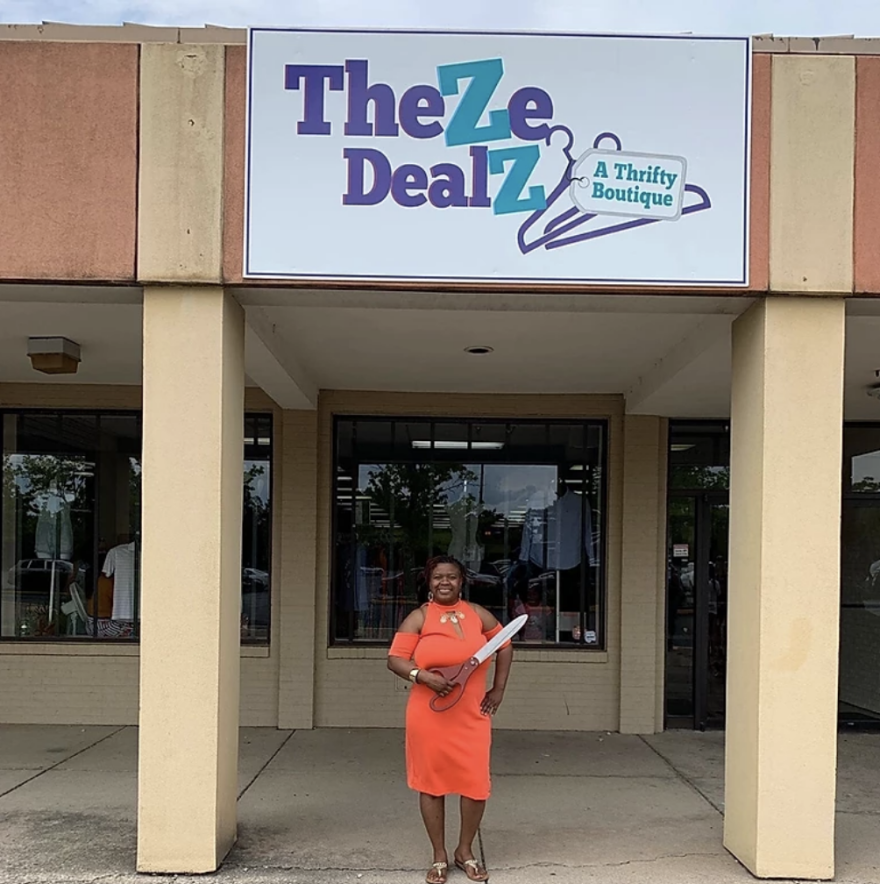As the state prepares to reopen restaurants, some bars and retail establishments, some business owners are wondering what the future holds. Small businesses that rely on foot traffic are especially hard-hit in the coronavirus non-essential businesses shutdown.
To survive, many have experimented with new business models. Now, some Dayton entrepreneurs say they hope their customers will feel safe enough to return when their doors finally reopen.
Gov. Mike DeWine is allowing retail stores to reopen May 12.
To take advantage of the date businesses have to follow a long list of strict guidelines designed to prevent the spread of COVID-19, including enforcing limits on the number of customers allowed inside at once, cleaning at least every hour and separating people by at least six feet at all times.
Zontaye Richardson owns the West Dayton thrift store Theze Dealz A Thrifty Boutique and says she’s ready to tackle the new public health coronavirus precautions.
She’s set a date to reopen 10 days after the official green light.
“I have set a target date," she says. "I recently set for May 22 — May 22nd is kind of a special day for me because that'll be our three-year anniversary.”
During the shutdown Richardson used Facebook Live and other digital tactics to help generate business and launched curbside order pickup. Demand is up for a pre-coronavirus mail order clothing subscription service she started and so are online sales overall.
Richardson says she’s confident this new online activity will mostly continue when her brick-and-mortar store reopens. But, she says some of her most loyal regulars can’t wait to get back to shopping for new outfits in person.
“I've heard a lot from my customers. I’ll have customers come by the door or they'll ride past, like, when are you going to open? We're waiting for you,” she says.
As a relatively new entrepreneur, Richardson’s overcome her share of startup obstacles already. The coronavirus is just another challenge to face, she says.
But, she admits there’s no way to predict exactly how many customers will choose to stay away because they’re afraid.

“Just because we are open doesn’t mean we’ll get the flow in like we had before. I think that you can be open and have all your utilities and your staff, and not really generate the income to support it," she says. "So, I think that's my biggest fear.”
She's been stocking up on PPE and amassing cleaning supplies such as bleach to be able to sanitize common areas constantly throughout the days the shop is open.
"I've been able to find gloves. We've also had masks made by local mask makers," she says. "Instead of trying to find regular masks in the store we've been able to purchase them from artists or people that are making masks, so that's been helpful."
Getting back to in-person business comes with its own set of special concerns for Dayton restaurants and bars that have been shut down for more than a month. Reopening also brings a host of difficult questions:
How do you maintain safety in an industry where close quarters and communal areas are the norm, where staff work shoulder to shoulder and profit margins are slim --- margins that would get even tighter as seating capacity is limited to keep a safe social distance.
“It remains to be seen, even at 50-percent capacity, if the demand is going to be there, are people comfortable coming out?"
Chris Dimmick is Managing Partner at the new downtown cocktail bar Tender Mercy. The nightspot opened just before Ohio’s essential businesses order took effect.
When the essential businesses order took effect, he and his partners quickly pivoted to curbside service. They opened a minimart selling toilet paper, groceries, face masks and other essentials.
But, like thousands of other hospitality businesses across the state, Tender Mercy furloughed all of its more than two dozen hourly employees. And when it reopens with social distancing in place only around half will come back right away.
“We can't bring everybody back all at the same time, and so I think we are just going to have to take it one day at a time. It’s not going to be easy for a lot of folks,” he says.
Dimmick says many of the company's part and full-time employees still have not received their unemployment checks or federal stimulus payments. They are struggling to make ends meet.
"We want to bring those folks back with priority because they're the ones that are desperately needing it," he says. "And being employed and starting to earn a paycheck will not jeopardize the benefits that are coming to to the folks that are getting it."
Still, Dimmick says he’s optimistic restaurants and bars will bounce back as people adjust to this new normal of the pandemic, similar to what eventually happened after the Great Recession and other national crises.
"After Sept. 11, a lot of people said this is going to kill the independent restaurant industry. They said we'd never come back. Within five years, there were 30 percent more restaurants in New York City than there were on Sept. 11. And yes, do people fall off? Are people not going to make it through? Yeah, we will have some some casualties, unfortunately," he says. "But it's a resilient business, it's a creative business and we'll all find a way.”
But for now, the state’s more than $24 billion restaurant and bar industry continues to suffer the pandemic’s shock.

The industry employs more than half a million workers statewide. To help unemployed and underemployed workers pay their bills, the Ohio Restaurant Association has opened a fund to provide financial relief, relief many will need for weeks to come.
On Thursday the governor announced restaurants and bars are free to resume outside dining May 15. Inside dining can begin May 21. Click here to read more about DeWine's announcement.



